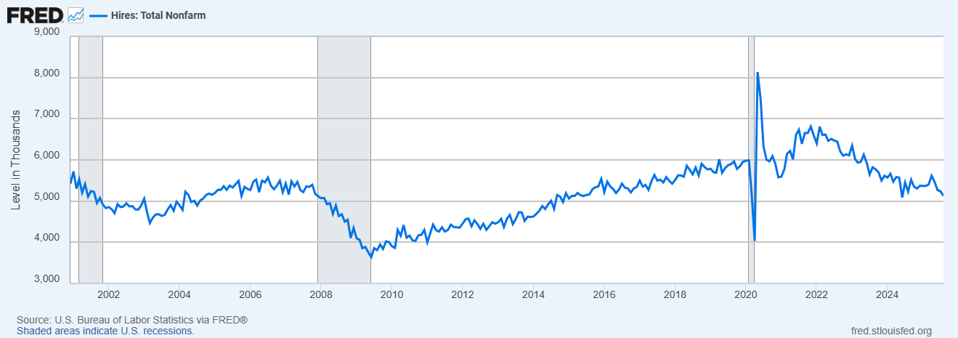When trying to understand the modern labor market, you might typically examine Bureau of Labor Statistics data (most current info not available because of the shutdown), private stats, and expert opinions. Looking to shareholder lawsuit settlements may not seem to be a good source of insight into the economy, but these are strange times.
‘Sham’ Hiring Charges
Wells Fargo has been dealing with an investor lawsuit alleging a practice of false job candidate interviews intended to prop up an image of diversity to satisfy an internal company program.
A story from Law360.com, “Wells Fargo To Settle Investors’ ‘Sham’ Hiring Case For $85M,” is one of a number of legal news outlets covering this story.
“Wells Fargo shareholders sued in June 2022, shortly after it was publicly disclosed that the U.S. Department of Justice was investigating the bank over claims that managers were interviewing candidates for already filled positions to meet a company expectation that they consider a more diverse candidate slate,” the story said.
I have a question in to the bank to ask about the allegations and will update this story when I hear back.
According to a story in Banking Dive, the plaintiffs alleged that the bank had conducted “widespread ‘sham interviews’ of diverse candidates.” Supposedly, the bank interviewed diverse candidates that wouldn’t be hired. Apparently, Wells Fargo had a diversity initiative called the Diverse Search Requirement, as law firm Kessler Topaz Meltzer Check noted.
“According to Wells Fargo, the Diverse Search Requirement mandated that for virtually all United States job openings at Wells Fargo that paid $100,000 a year or more, at least half of the candidates interviewed for an open position had to be diverse (which included underrepresented racial or ethnic groups, women, veterans, LGBTQ individuals, and those with disabilities),” the firm wrote.
Did Anything Happen? Is Anyone Guilty?
The preliminary settlement — Bloomberg Law hosted a copy — said that it was “the product of arm’s-length negotiations facilitated by an accomplished mediator, the Honorable Layn R. Phillips (Ret.), including formal mediation and briefing, and ultimately the Parties’ acceptance of Judge Phillips’ recommendation to resolve the Action.”
There is no admittance of fault. Instead, a statement of the plaintiff recognizing the “significant risks” of taking legal action and instead finding common ground displaced questions of admissions of fault. Corporations agreeing to settlements often insist on verbiage that explicitly exclude admissions of fault. The agreement seems to sidestep the question completely.
There are serious shifts going on in employment. Many job advertisements are reportedly fake, as Forbes contributor Rachel Wells reported last year. One study of 1,641 hiring managers found 40% of respondents admitted to posting fake job notices. The practice isn’t new, but it has jumped in popularity to create an impression to competitors and shareholders.
Workforce analyst and consultant Amanda Goodall has argued that many job listings are fake and intended to make people — investors, business partners, customers — believe an image of growth, to make the shareholders happy.
It’s hard to know for sure, except that the number of new job openings according to government surveys has been sliding since November 2021.
If you hear about heavily advertised positions, they might be true or they might not be. However, sometimes it is important for your mental health to realize there may be fundamental shifts in labor market that are not well understood yet that are catching many up in their vortexes.

